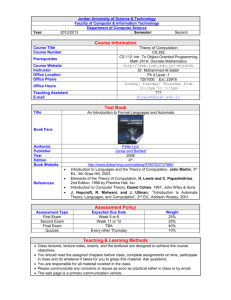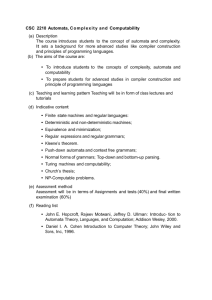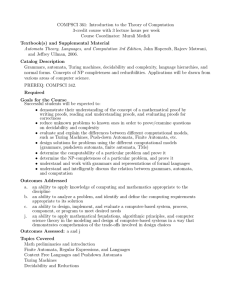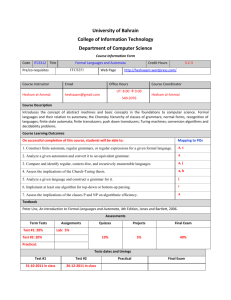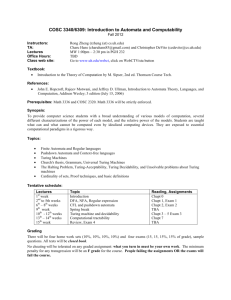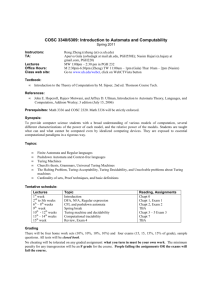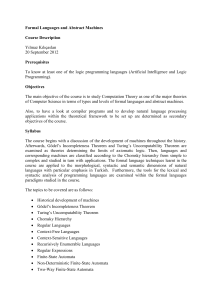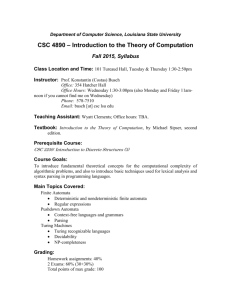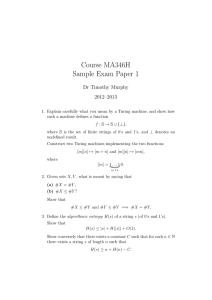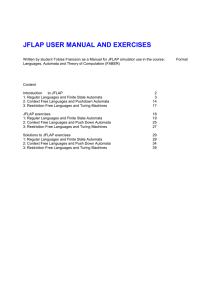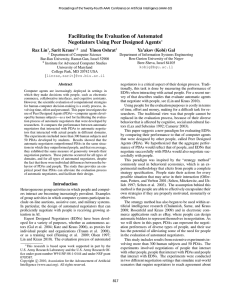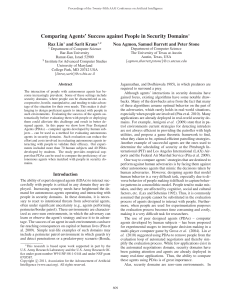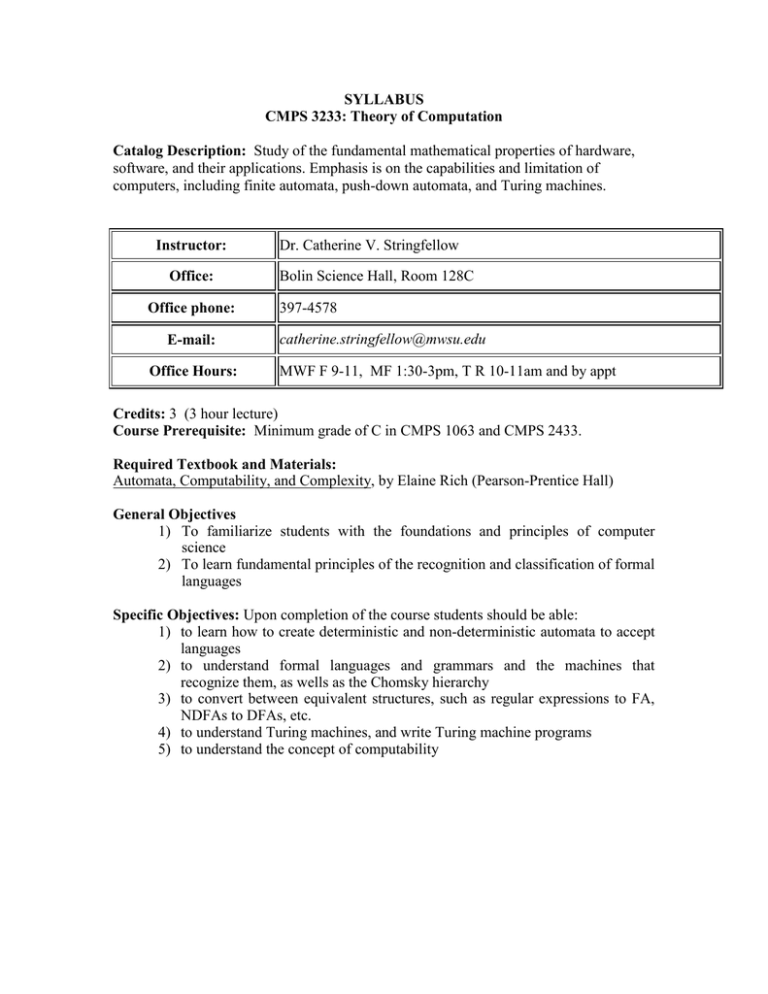
SYLLABUS
CMPS 3233: Theory of Computation
Catalog Description: Study of the fundamental mathematical properties of hardware,
software, and their applications. Emphasis is on the capabilities and limitation of
computers, including finite automata, push-down automata, and Turing machines.
Instructor:
Office:
Office phone:
E-mail:
Office Hours:
Dr. Catherine V. Stringfellow
Bolin Science Hall, Room 128C
397-4578
catherine.stringfellow@mwsu.edu
MWF F 9-11, MF 1:30-3pm, T R 10-11am and by appt
Credits: 3 (3 hour lecture)
Course Prerequisite: Minimum grade of C in CMPS 1063 and CMPS 2433.
Required Textbook and Materials:
Automata, Computability, and Complexity, by Elaine Rich (Pearson-Prentice Hall)
General Objectives
1) To familiarize students with the foundations and principles of computer
science
2) To learn fundamental principles of the recognition and classification of formal
languages
Specific Objectives: Upon completion of the course students should be able:
1) to learn how to create deterministic and non-deterministic automata to accept
languages
2) to understand formal languages and grammars and the machines that
recognize them, as wells as the Chomsky hierarchy
3) to convert between equivalent structures, such as regular expressions to FA,
NDFAs to DFAs, etc.
4) to understand Turing machines, and write Turing machine programs
5) to understand the concept of computability
Instructional Method: Primarily lecture and class participation. Every student will be
required to present assigned problems to the class. The problems will come primarily
from the homework assignments.
Course Assignments and Evaluation: Quizzes and homework assignments will be
assigned. Quizzes may be announced or unannounced. These will consist of problems
from those at the end of sections in the text and the JFLAP manual and problems
provided by the instructor. Homework problems may or may not be graded. Students
will be called upon to work problems on the board – if unprepared it will be a 0 for the
problem.
There will be two exams and one final.
Final grades will be based on the following criteria.
Activity
percentage of grade
Boardwork and participation
Homework assignments
Two exams
Final (Tues. May 10, 1-3pm)
20%
30%
40%
20%
Grades may be determined according to this scale (approximate):
A
90% - 100%
B
80% - 89%
C
70% - 79%
D
60% - 69%
Makeup Exams and Quizzes: There is one midterm and one final exam. The only
acceptable reason for missing an exam is with a valid university excuse (e.g., excuse
from the doctor, death in the immediate family, etc.) A makeup exam will only be given
to those students who have a valid excuse. If you know ahead of time that you will miss
an exam, please see me.
** Students should refer to the current MSU Student Handbook and Activities
Calendar and the MSU Undergraduate Bulletin for policies related to class attendance,
academic dishonesty, and student responsibilities, rights and activities. For more
information on plagiarism and how to avoid it, see http://plagiarism.org/
Spring 2016
TENTATIVE CS3233-ACADEMIC CALENDAR
Jan
19
Jan.
26
Feb
2
Feb
9
Feb
16
Feb
23
Mar
1
Mar
8
Mar
15
Tuesday
Thursday
Course Info; CH1: Why?
Cont.
CH2: Alphabets, Strings and
Languages
CH3: Hierarchy of Languages
CH4: FAs : DFAs
Cont.
CH1: 1, 2
CH5: NDFAs
CH2: 1, 2, 4
REs and RLs
CH6: Regular Languages :
Regulars Expressions
REVIEW
CH4: 2, 4, *6
EXAM1
CH7: Regular Grammars
CH3: 1, 2, 4, 6
CH4: Properties of Regular
Languages : Closure
CH11: Context-Free
languages : Grammars
CFGs and Prog Langs
Parsing
1
JFLAP Assg
2
3
4
5
6
7
8
Cont.
CH6: 1, 2, 4
CH6: Simplifying CFGs
CH7: 1, 2, 3
9
Spring Break
Mar
31
10
Apr
5
11
Apr
12
12
Apr
19
13
Apr
26
14
May
3
15
May
10
16
Normal Forms
REVIEW
EXAM2
CH12: PDAs: Non-det. PDAs
CH5: 1, 5
PDAs and CF Languages
Cont.
CH6: 1, 6, 8
Det. PDAs and non-det. PDAs
CH17: Turing Machines
CH9: 1, 4, *12
Cont.
CH17: Other Models of TMs
Cont.
Review
FINAL EXAM
1-3pm
* short program assignment

